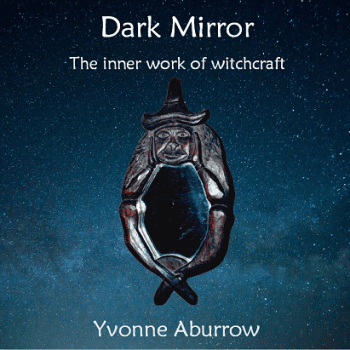Hello, beautiful creatures. Believe it or not, I’m still recovering from PantheaCon. I mean, I’m out of the woods as far as the con crud is concerned, but I’m still processing a lot of what I took in during the convention, intellectually speaking. One of the major trains of thought that arose over the weekend which has since parked on the tracks of my brain has to do with the dynamic within the p-word community around seekers and teachers.
One of the common narratives within our interlocking communities, so common as to be almost a cliché, is that of the Seeker. This narrative might be new for some of you, while those of you who’ve been around the block a time or two will know this one. The story of the Seeker is a classic narrative, almost a folk ballad in its structure, and like any good folk ballad, it has a dizzyingly large number of variations. Some end well for the seekers, while others… not so much.

In the first verse, the Seeker—young, bright-eyed, optimistic—discovers that Paganism (or the occult, or polytheism, or what-have-ye) is their True Spiritual Home™. They read every book with a crescent moon or an ankh on the spine they come across. They scour every website, Tumblr page, and cobweb-bedraped Usenet archive they can find. Slowly, over time, they assemble a personal practice which looks something like what they believe witchcraft, polytheism, Paganism, or magic to be. Things are going pretty well, but they’re not quite satisfied. Their practice is good, but it’s missing… something.
Then one day, somewhere in the second verse, it finally happens: in one of their meatspace or Internet peregrinations, they come across a real-life, no-foolin’ Teacher. This Teacher may be a witchcraft elder, or a high-ranking initiate of a magical order, or some other flavor of grand high muckety-muck1 who has the Answers, knows the Lore, and—miraculum miraculorum!—will actually deign to speak to the Seeker!
Those of you who’ve been around the block a time or two will know what happens at the end of the second verse: the Seeker immediately leaps into studying with the Teacher.
As time and the third verse both pass, and the Seeker—now the Student—comes to discover that the Teacher isn’t wholly perfect, wise, and good. Perhaps the Teacher is cranky, irascible, and occasionally unreasonable, or they’re flaky and inconsistent in their teaching. Maybe they seem perfectly fine as a Teacher, but you start to notice that their personal life is a radioactive dumpster fire on wheels, or in some way at odds with the values of the path they’re teaching. Or perhaps the Teacher isn’t just imperfect, but overtly abusive and gaslighting, manipulating the Student and making demands on their personal life in exchange for access to the Mysteries™. However it plays out, verse three is usually the point in the story where the Student realizes that the Teacher isn’t everything they believed them to be at first, and has to deal both with the disappointment of learning their idol has feet of clay and with the ramifications of that imperfection.
The fourth verse plays out differently, depending on the narrative. If the Teacher is merely an imperfect human being with, like most of us, qualities both laudatory and irritating, the Student will either find a way to reconcile the paradox of learning from imperfect Teachers or, sadly, swear off this Teacher to study with another, equally imperfect Teacher. In the bad scenario, the Student has to escape the abusive Teacher, and possibly the community which supported or covered for that Teacher’s abuse.
Finally, there’s the last verse, different to every version. In some, the Student becomes the Practitioner, and hints are made that the Practitioner may one day become a Teacher themselves. In others, the Student leaves their studies behind, to go be an Episcopalian or something. In the really bad versions, the abused Student will set themselves up as a Teacher, promulgating a version of the teachings marred by anger and resentment… but that’s a bit beyond the scope of today’s ballad. (That’s more like a concept album of terribleness, for another day.)
As I said, anyone who’s been around the block a time or two already knows how this song goes. Some of you haven’t, though. Some of you may even, like the protagonist of our pseudo-Child ballad here, be seekers in the process of deciding whether or not to take up with a particular Teacher. Having been both the Seeker/Student and the Teacher myself, and having this platform on which to make my ideas known to the world, I hope you’ll allow me to offer you some unsolicited, but informed and well-intentioned advice on being a discerning seeker… and, because I’m currently trapped in a metaphor, I hope you’ll forgive me for phrasing it as though I were an English balladeer: Ere a student of magic you’ll be / First you must answer these questions three:
Do you want to learn what they’re teaching?
This might seem like a stupid question, but I encourage you to pause with it for a moment. When you’ve been standing at a rainy bus stop long enough, it can be really tempting to take the first bus that seems to be going more or less in the direction of home. So too with teachers. If you’re wanting to learn what’s known these days as “traditional witchcraft” à la Cochrane, Chumbley, et al., studying with a Gardnerian elder might give you some necessary skills and valuable experiences, but it’s not going to get you where you’re intending to go. Of course, you may find you quite like where you end up, but before you sign on with a particular teacher, ask yourself if you’re looking for this teacher and this path… or if you’re just looking to get out of the rain. (Also note that there’s no shame in choosing to get out of the rain, as it were. Just be clear, with yourself and your prospective teacher, that that’s what you’re doing.)
Are you simpatico?
“Simpatico” is a word borrowed from Italian and Spanish originally to describe someone who was agreeable, likable, and congenial, and has since been used to describe relationships between people, as well. First meetings with a potential teacher can be awfully awkward for a variety of reasons, but try to pay attention to your reactions to them, and theirs to you. The teacher/student relationship can be emotionally intimate, so it behooves you to ask yourself: can you see the two of you getting along, on a fundamental level? Do you share similar enough outlooks on life that you’re not going to get on each other’s nerves? If you’re a boisterous extrovert who loves to hare off on side tangents and they’re a quiet, focused introvert, that may or may not be the best match, but if you’re a committed vegan pacifist and they’re a deer-hunting NRA member with a concealed-carry license… well, let’s just say that the odds aren’t ever in your favor.
Do you want a life like theirs?
This question doesn’t refer solely to the outward particulars and circumstances of their daily doings, but to the emotional and energetic character of their life. The spiritual work we do, be it devotional or functional, resonates and reflects throughout every aspect of our lives. Power flows where attention goes, so it’s relevant to consider where their power is flowing, and what it’s feeding. This isn’t to say that a teacher’s life should be wholly free from bad stuff; on the contrary, no level of spiritual development removes you from the human condition2. We all have sorrows, and even minor irritations can become major issues from time to time. However, if you find that your prospective teacher is mired in a seemingly endless series of crises more befitting a drama on The CW, it’s a good time to ask yourself if they’re really in a condition to be teaching, and if you wouldn’t be inviting more of the same into your own life by studying with them.
So there you go, friends and seekers. If thou canst answer these questions three… well, you might not marry any knights or maidens fair, but you’ll at least have a better sense of whether or not you want to hitch your spiritual progress to a given teacher or path. And honestly, unless you’re the protagonist in a Child ballad, that’s probably going to be a lot more useful in the long run.
Until next time, dear ones, shop smart. ♥
- Grand high muckety-mucks who are currently rearing up on their hind legs to give me what-for are respectfully reminded that I, too, am a grand high muckety-muck in three different traditions, and am painfully aware of just how high the clay content of our feet is.
- Barring those levels of spiritual development at which one becomes an Ascended Master™, Ipsissimus™, or some other form of not-really-human-anymore… at which point none of this is particularly relevant anyway, so who cares?












